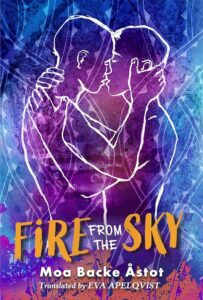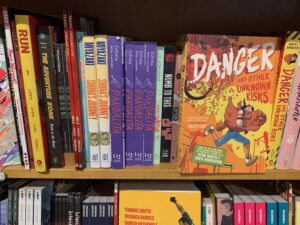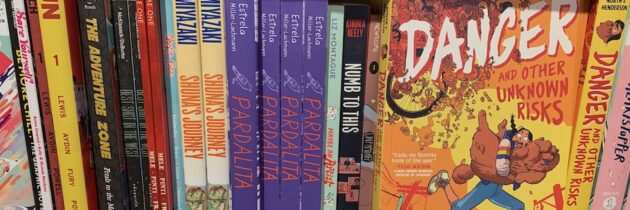Making Kidlit in Translation Mainstream
Readers may be thinking that I’ve taken this mattress testing thing a bit too seriously, given that I’ve been sleeping on this blog for more than a few days. It has been a popular post, but I’m also allowing myself some time to recover from the sting of an unexpected rejection.
No, it wasn’t for my book manuscripts but for a conference panel proposal that I helped to write. While I will be attending NCTE in Boston this November and am excited to be on a panel titled “Advocating for Neurodivergent and Disabled Kids and Creating Inclusive Classrooms Using Children’s and Young Adult Books,” the proposal for panel on using international literature in translation in the language arts classroom was not accepted.
 I wasn’t officially a member of that panel but I advised the group of translators — Eva Apelqvist, Nanette McGuinness, Holly Thompson, and Kip Wilson — who put the proposal together, and I was eager to hear what they had to say. Eva’s translation from Swedish of the YA novel Fire from the Sky by Moa Backe Åstot won a Printz Honor from the American Library Association this year. It’s only the second time a YA book in translation has received a Printz Honor, an award given to outstanding books for teen readers. The recognition of Fire from the Sky, the story of a gay teen whose desire to remain within his endangered Sami community is jeopardized by the community’s unwillingness to accept him for who he is, represents the “mainstreaming” of international literature in translation. It’s an outstanding book, no matter its language of origin.
I wasn’t officially a member of that panel but I advised the group of translators — Eva Apelqvist, Nanette McGuinness, Holly Thompson, and Kip Wilson — who put the proposal together, and I was eager to hear what they had to say. Eva’s translation from Swedish of the YA novel Fire from the Sky by Moa Backe Åstot won a Printz Honor from the American Library Association this year. It’s only the second time a YA book in translation has received a Printz Honor, an award given to outstanding books for teen readers. The recognition of Fire from the Sky, the story of a gay teen whose desire to remain within his endangered Sami community is jeopardized by the community’s unwillingness to accept him for who he is, represents the “mainstreaming” of international literature in translation. It’s an outstanding book, no matter its language of origin.
Fewer than five percent of books published in English in the United States are translations of international literature. The percentage is far higher in other countries, in some cases exceeding 50 percent. At a time when readers are seeking authentic literature based on the authors’ lived experiences — hence the success of our neurodivergent and disabled authors’ panel — we need more books set in other countries, written by people from those countries and translated into English. Our world is highly connected, and what happens in one country has enormous implications for people living everywhere else. We see it today with campus protests over Israel’s war in Gaza. People care, and we need to provide the literature that will increase understanding of these issues.

Batchelder honoree Pardalita in the YA Graphic Novel section of Books of Wonder, part of the mainstream.
The four author/translators from the panel have not given up. We know that it will take more education and advocacy to convince teachers and librarians of the value of international children’s and YA books in translation. I have now officially joined the panel, and we’re resubmitting the proposal to other conferences and events. Fingers crossed for our panel for nErDcampPA, a one-day remote conference in early July. [Update 7/24: That panel was turned down as well.] I have also joined the team at #WorldKidLit to review one book in translation each month and plan to focus on books from southern and eastern Europe and the Middle East.
If you know of a new or forthcoming book that needs a review, please let me know! In return, I’ll update you all on our efforts to bring international kidlit in translation into the mainstream for libraries and language arts and social studies classrooms (and maybe some science classrooms as well!).







What an excellent reminder of what literature in translation could and should be in our country, a normal part of the literary landscape, not something “other”. Thank you, Lyn.
Thank you, Eva, and congratulations on your much-deserved Printz Honor!
I want to hear that panel on literature in translation in the language arts classroom… consider me registered for whatever conference accepts it!!
Thank you! I really like the activity you created where the students did a treasure hunt through the library shelves in search of translated books, their translators, and the original language. We’d love to use it, with attribution.
You’re very welcome to use it!
I really want AI developers to understand the immense nuance and artistry that goes into translating a book. There’s a widespread belief right now that this can be automated. I’d love for you to chime in on this topic. (I know, I know – I’m giving you homework. I apologize)
AI really does not have the capability to perform literary translation. There’s too much nuance and context. Last year the PEN World Voices Festival featured a translation slam with two professional translators and AI translating passages from a novel in Spanish, and AI got it spectacularly wrong.
So glad you’re on that panel, Lyn.
Um, how is that graphic novel: Danger and Other Unknown Risks?
I haven’t read Danger and Other Unknown Risks. It was just on the shelf next to Pardalita, a demonstration that translated graphic novels fit right in with those originally published in English. Moreover, there’s at least one other translated book on that shelf, from Japan.